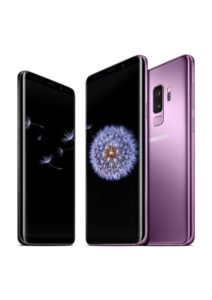“A new user authentication system called Intelligent Scan combines improved facial recognition with the iris scanning technology pioneered by last year’s Galaxy and Note devices to allow for an even more secure…”

Samsung’s latest Galaxy smartphone has been announced, and it’s pretty much what was expected: A better version of last year’s Galaxy S8, with an improved camera system and more sophisticated biometric security.
As Samsung hinted ahead of the device’s launch, the focus would very much be on the Galaxy S9’s imaging capabilities. Like the iPhone X and the iPhone 8 Plus, the S9 and S9+ sport a dual camera system that allows for genuine depth perception. Also like the latest iPhones, the S9 devices’ imaging capabilities are improved with AI, allowing for users’ facial expressions to be mapped onto animated emojis. (Samsung calls these “AR Emojis”, as opposed to Apple’s “Animojis”.)
That brings us to the device’s improved biometric technology, which relies in part on these imaging capabilities. A new user authentication system called Intelligent Scan combines improved facial recognition with the iris scanning technology pioneered by last year’s Galaxy and Note devices to allow for an even more secure, passive authentication system. That, of course, also represents an echo of the iPhone X, which made waves with its highly secure infrared facial recognition system allowing users to unlock their device just by looking at it; but while Face ID is the iPhone X’s only biometric authentication system, Samsung’s is multimodal, with fingerprint recognition to boot.
Unfortunately, the latter has arrived not within the display, as is the case with a pioneering new smartphone from Vivo; but is instead under the camera system on the rear of the smartphone, a location that caused a lot of frustration for some users of the Galaxy S8. Some S9 users will appreciate that they can now assign a specific fingerprint to unlock their device’s Secure Folder, but many will be frustrated that Samsung has retained this same design feature.
Nevertheless, it’s clear that in terms of the Galaxy S9’s security, Samsung’s emphasis is on Intelligent Scan, with fingerprint recognition playing an auxiliary role. For some security-conscious consumers who aren’t sure whether to buy the iPhone X or the Galaxy S9, given their many similarities, that could make the difference. So could the price: Samsung’s S9 starts at $719.99, considerably lower than the iPhone X’s thousand-dollar price tag.
The S9 and S9+ will hit the market on March 16th.

Follow Us